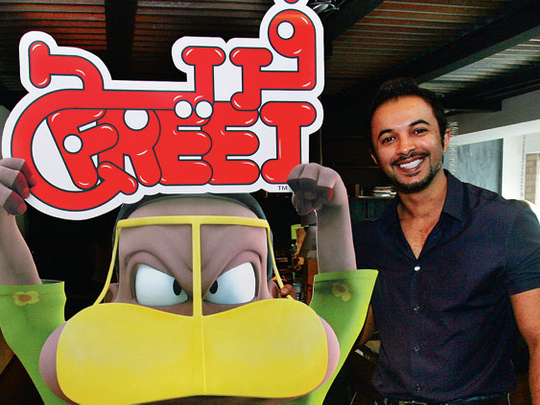
It takes courage and fortitude to design an animated series centring around four very unlikely cartoon heroes — traditional Emirati grandmothers — and create a niche for them in the bustling world of Popeye, Garfield, Tom and Jerry, and Shrek. As the creator of the Middle East’s first media brand, Freej, 33-year-old Mohammad Saeed Harib has proved that if you dare to dream, you will also get the determination to achieve it
The journey of Freej began in 1998, when as a student of general arts and animation at the North Eastern University in Boston, Harib was asked to create a superhero based on his culture. “Our culture is very rich in superheroes such as Aladin and Alibaba, but I could not find a suitably modern Arabic character that could fit the bill of a superhero,” Harib tells Gulf News.
“Digging into the history of the region, I read a lot about our grandfathers and their struggles as pearl divers, but found hardly any mention of grandmothers. In the absence of grandfathers, they acted as matriarchs, raising children in a very harsh environment, going out to work and also instilling the correct values in her children. That’s why I created the figure of Um Saeed, a grandmother.”
Harib designed her differently from other old women around the world: she wears a mask on her face and henna on her feet. “Being a senior citizen, I knew, she was a very unconventional superhero. But now the idea of a superhero has also changed: they are like us, and we can all relate to them. Our grandmothers lived a very simple life but their wisdom is truly amazing: they can advise and insult in the same breath,” he says.
But turning a classroom cartoon into a successful TV show wasn’t easy. He spent three years making business plans, risk assessments and finding money for the project. “Back then it was not easy to find finance for media projects in Dubai and animation was unheard of,” he says. He spent three years negotiating with the Mohammed Bin Rashid Establishment for Young Business Leaders, he adds, before they agreed to give a guarantee for a bank loan of Dh3 million.
The series revolves around four elderly women, Umm Saeed, Umm Saloom, Umm Allawi and Umm Khammas, who live in a modern metropolis (in Dubai) and narrate various issues that concern them owing to the rapid social and cultural transformation. The show was initially launched as an experimental project and didn’t have any long-term strategy. “It was a dream which I wanted to achieve. I am fortunate that the dream set a trend,” he says. The success of Freej has lead to the launch of merchandise lines and also a theatrical production. It is also the first Arabic show to be packaged in DVDs. Harib has recently signed a deal with Cartoon Network to telecast the show in several Asian languages. “The show was not really meant to go global. In fact, the story line was too local. But the cherry on the pie was expat viewers, who tuned in for the show as they wanted to learn about Emirati culture and how UAE nationals see themselves. Many expats here are often intimidated by Emiratis and prefer to maintain a distance from us. Freej humanised us,” he says.
Fans will have to wait some more time before they can enjoy a Freej film on big screen. “Though we have the capacity to make a film, it does not make any business sense right now as we do not have enough cinemas to cover costs of production,” he says. “[And] to release a film internationally we need to create awareness for it through TV shows, which we have just begun to do.”
Harib is, however, not somebody to rest on his laurels. Beyond film, he consults on matters of identity, having designed the logo for the Dubai International Film Festival (DIFF), and works on events, organising the opening ceremony of DIFF every year. He believes he brings vital local knowledge to events he works on. “Most events companies in the UAE lack knowledge to duly portray Emirati heritage: our culture is not restricted to only stick and hair dancers. In my shows I try to create an experience that is not only culturally rich, but also visually engaging.”
As the citizen of a country that has helped him realise his dreams, Harib says National Day is truly special. “What the founding father of the UAE, late Shaikh Zayed Bin Sultan Al Nahyan did was not easy: forming a union of seven disparate emirates. It required a vision. We spent the last 40 years to build the infrastructure and today we’re ready to support other sectors thrive. All the emirates are creating their own cultural identities; they are competing with and beautifully complementing each other,” he says.












